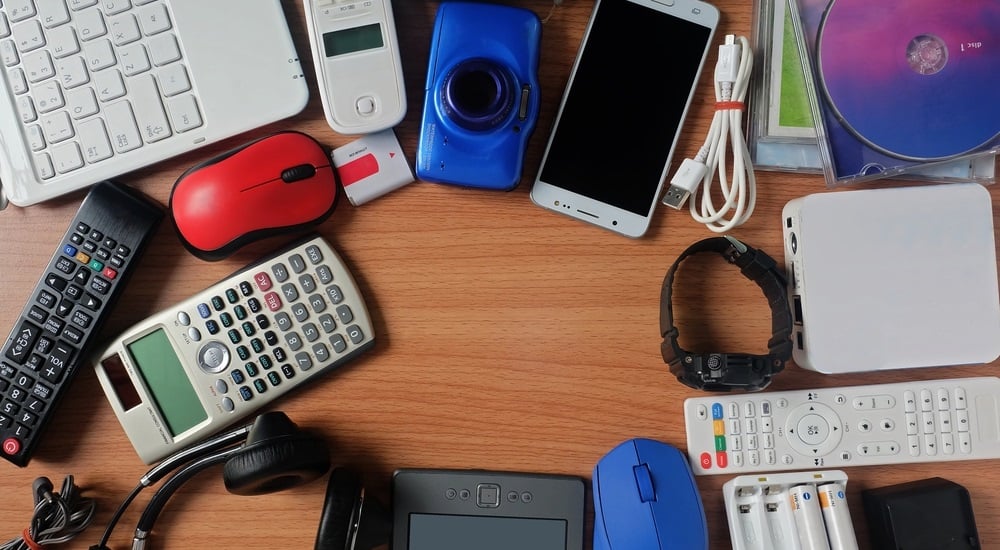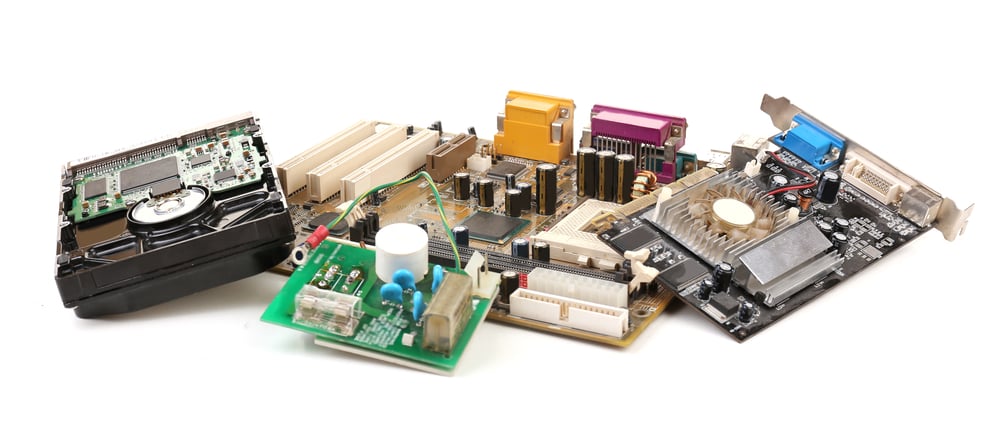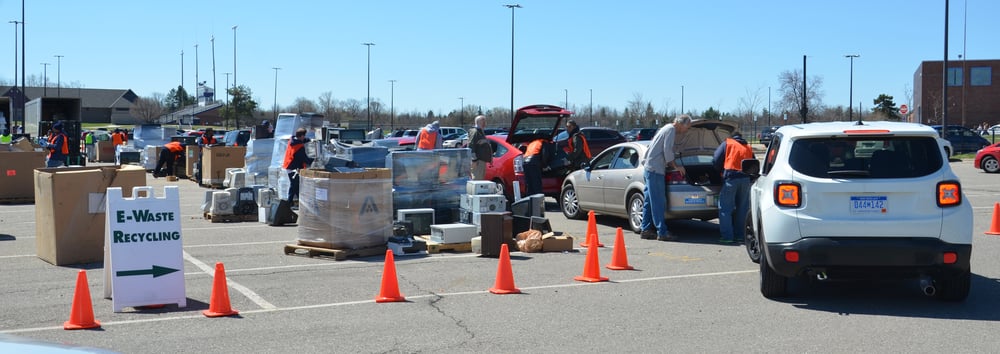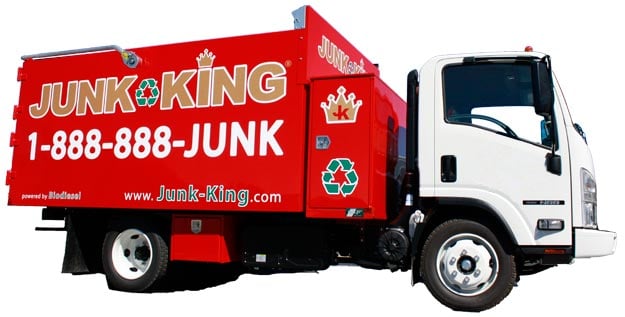
[This article was originally published in November 2020 and has been expanded and revised.]
We love getting new electronic devices. And the holidays are a great time to give and receive them. But that means getting rid of the old ones.
E-waste, or electronic waste, is a growing problem globally, as well as in the U.S. and it is only getting worse.
The Holidays Are an Electronic Winter Wonderland
While we purchase and replace hundreds of thousands of electronic devices throughout the year, every year, the holidays are a particularly active time for consumer electronics.
According to a recent post by Statista,
"Consumer electronics are home or personal electronic devices intended for everyday use, including devices for entertainment, communication, and recreation. The retail revenue from consumer electronics sales in the United States is expected to reach close to 505 billion U.S. dollars by the end of 2022, recording a growth rate of almost three percent."
Of course, a large portion of those sales took place on or near Black Friday with smartphones being the leading consumer tech product by sales in the United States. While overall sales have dropped somewhat in 2022 with the rise of inflation and other factors, the volume of electronic purchases is still far above those during the COVID-19 pandemic era.
One of the problems with electronics is that new purchases are often made to replace old items. While some simply are adding to the collection of consumer electronics they already possess, old phones, old tablets, and old entertainment devices are often disposed of.
These discarded electronics, devices, and components are collectively referred to as electronic waste or e-waste.
And they are a problem.

E-Waste, Landfills, and the Environment
It would be fairly accurate to state that not all waste is created equal. Some materials are inert and inherently harmless when disposed of.
Most organic waste, clean wood, and materials such as excess soil and gravel, for example, have little or no impact on the environment when placed in landfills. Other waste items not only take up limited space in our landfills but also pose a real environmental threat when buried in them.
And electronic waste, or e-waste, ranks right up there with some of the worst.
A good description of "e-waste" can be found at Wikipedia,
"Electronic waste or e-waste describes discarded electrical or electronic devices. Used electronics which are destined for refurbishment, reuse, resale, salvage recycling through material recovery, or disposal are also considered e-waste. Informal processing of e-waste in developing countries can lead to adverse human health effects and environmental pollution.
Electronic scrap components, such as CPUs, contain potentially harmful materials such as lead, cadmium, beryllium, or brominated flame retardants."
And it's all those toxic metals and other materials in e-waste that pose a hazard to people and the environment.

Because of these hazards, many states and other agencies have begun to regulate the proper disposal of used electronics. California is a good example of that.
According to that state's environmental protection agency, CalRecycle, the term "e-waste" is loosely applied to consumer and business electronic equipment that is near or at the end of its useful life.
Their website goes not to note that there is no clear definition for e-waste. In other words is has not been established whether or not items like microwave ovens and other similar "appliances" should be grouped into the category of "e-waste."
And, based on the condition and density of certain materials in electronic products, it can render them as hazardous. In fact, California law treats nonfunctioning cathode ray tubes (CRT) from televisions and computer monitors as hazardous.
The problem is that we often find ourselves inundated with a variety of old electronics and it can be a chore to properly dispose of these, or to figure how and where to donate them if they're still usable.
Batteries: The Beating Heart of Electronics
Unless your electronic device or appliance is continually plugged in to an electrical outlet, it is most likely powered by batteries. Regardless of whether these are disposable batteries or some type of rechargeable, they pose a real hazard when they eventually tossed out.
According to Wikipedia, for example,
"Lithium-ion batteries contain metals such as cobalt, nickel, and manganese, which are toxic and can contaminate water supplies and ecosystems if they leach out of landfills. Additionally, fires in landfills or battery-recycling facilities have been attributed to inappropriate disposal of lithium-ion batteries."
In fact, while most sources state that lithium battery products are not particularly hazardous if placed in landfills, the Environmental Protection Agency states that "Lithium batteries are hazardous materials and are subject to DOT's Hazardous Materials Regulations."
In addition to the safety and health hazards posed by improper disposal of lithium, or li-ion batteries, there is a significant production concern, as well.
The EPA notes that,
"Li-ion batteries are made of materials such as cobalt, graphite and lithium which are considered critical minerals. Critical minerals are raw materials that are economically and strategically important to the U.S., have a high risk of their supply being disrupted and for which there are no easy substitutes. When these batteries are disposed of in the trash, we lose these critical resources outright."
However, despite the obvious benefits of recycling lithium-ion batteries, the vast majority of used lli-ion batteries still go to landfills once they reach their end-of-life. Unlike lithium batteries, which have shorter lifespans and are not rechargeable, lithium-ion batteries are far more complex in their construction and much more hazardous to recycle.
As one source has pointed out, recycling lithium ion batteries is expensive and challenging, it is cheaper to buy new lithium than to use recovered lithium from old batteries.
E-Waste is a Fact of Consumer Life
We buy a lot of electronics!
In fact, the sales of smartphones alone makes up a huge amount of the overall electronics consumed in the U.S. and globally. According to one source, in 2019, over 1.5 billion mobile phones were sold. And over 19 billion mobile phones have shipped worldwide between 1994 and 2018.
When it comes to new laptops, they are slackers either. In 2019, it's estimated that there were over 42 million units sold just in the United States alone. And, of course, there were tablets, e-readers, and a variety of other electronic devices sold. All of which often replace existing devices.
And that means more "e-waste" potentially going into the garbage and waste stream.
We created this infographic to provide a, well, "graphic" overview of the the state of e-waste and e-waste recycling.

Recycling old electronics is a practical and highly beneficial alternative to simply tossing them into landfills. Unfortunately, we are still a long ways from recycling 100 percent of our e-waste.
In fact, less than 15 percent of all e-waste is recycled, according to the EPA. But the potential is there for not only recycling this "junk", but for reclaiming the valuable materials and resources within the e-waste.
So, what should you do this holiday season when it's time to replace your old electronics with all the new gadgets you got as gifts?
Your Partners for Holiday E-Waste Recycling
Call on Junk King to provide you with our efficient, safe and eco-friendly e-waste removal service. With Junk King, you don’t need to worry about the pick up or disposal of your old, unusable or unwanted electronics. We'll take care of it for you.
Not only that, but we make sure that your old electronics end up in the right place: a non-profit for electronics that are still functioning, or a recycling facility for those that aren't. We'll make sure that your e-waste is disposed of in an eco-friendly way.
We remove almost all types of e-waste, including:
- Computers
- Monitors
- Printers
- Copiers
- Televisions
So, when you 're ready to get rid of your old electronics we make it as simple as 1, 2, 3.






